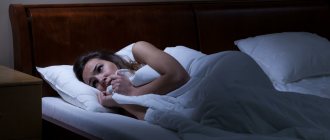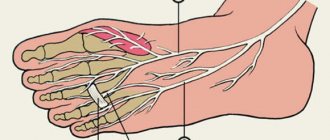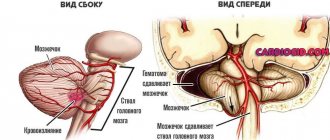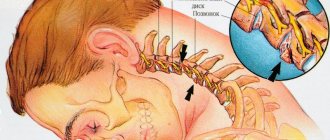Features of “nervous” itching
The condition when the skin itches due to nervousness is a fairly common phenomenon. The fact is that nervous tension and stress lead to a weakening of the immune system, as a result of which it begins to attack its own cells. Failures in the body cause various unpleasant physiological symptoms, one of which is itchy skin. “Nervous” scabies is usually accompanied by:
- general weakness during the day;
- severe nervousness;
- stiffness in the body;
- the appearance of red spots or blisters on the skin;
- burning, tingling sensation.
Associated symptoms are also all typical manifestations of stressful situations, namely: tachycardia, blood pressure surges, body tremors, frequent urination, diarrhea, headaches, breathing disorders.
Itching can occur both immediately at a time of severe anxiety, and some time after stress. Any part of the body can itch - from the face and neck to the fingers and toes. Many patients note that the itching becomes more intense in the evening and at night.
It is simply impossible to ignore such a manifestation and put off solving the problem until later. If rashes on certain parts of the body can still be hidden under clothes, then there is no escape from the constant desire to itch. Moreover, regular scratching of the skin leads to multiple scratches and cracks appearing on its surface, causing a person’s appearance to suffer even more.
Patient management
General events
- If your skin is dry, use soap substitutes with a moisturizing effect instead of soap, and apply moisturizing cream to your skin 2-3 times a day.
- Review the list of medications you are taking: if a possible cause of itching is a medication, it needs to be changed.
- For atopic/contact dermatitis: topical corticosteroids once a day for 2-3 days if there is inflammation but no infection.
- For scabies: topical permethrin or malathion.
- For cholestatic itching due to obstruction of the common bile duct: duct stenting – if possible.
Nonspecific treatment
It is carried out taking into account the condition of the skin - different approaches to local treatment on intact and macerated skin.
Antipruritic agents for topical use: 0.5−2% cream with levomenthol (menthol) is effective on intact skin if the itching is localized or more intense in a certain area.
Sedating antihistamines can be prescribed 1 hour before bedtime; if the effect does not persist for a day, two-time use is possible:
- Hydroxyzine/Atarax, Vistaril 25 mg orally at night;
- promethazine/Pipolfen 25 mg orally at night;
- diphenhydramine/Diphenhydramine 50 mg orally 1–2 times a day;
- Dimetindene/Fenistil 1 mg orally daily plus Fenistil gel (0.1% dimethindene) topically 3 times a day will help in most difficult cases.
Some non-sedating antihistamines may have an antipruritic effect (eg, loratadine/Claritin, cetirizine/Zodac, Zyrtec).
Antihistamines for external use (for example, Fenistil cream) on intact skin are used for no longer than a few days in cases where itching is caused by the release of histamine (for example, acute drug rash).
TCAs with antihistamine properties: doxepin/Doxepin in a dose of 10-75 mg orally at night. Antidepressants will help in cases where anxiety or depression occurs.
Specific treatment
Table 1 and Appendix 1 present the principles and regimens of drug therapy for itching of various etiologies.
What to do about it?
To eliminate skin itching due to nervousness, first of all, it is necessary to achieve an improvement in the psychological state. Mild sedatives, breathing exercises, and meditative techniques will help you relax and relieve anxiety. If the stress has already passed, and scabies arose later, you can use anti-itch medications such as Boromenthol, Nezulin or Fenistil to alleviate the condition. Some folk remedies will also work.
- A bath with a series relieves itching and has a beneficial effect on the skin. Pour two tablespoons of the string into a glass of hot water and let the mixture brew for 20 minutes.
- Rubbing the itchy areas with tomato juice mixed with water in a 2:1 ratio can also help.
- Lemon balm tea relieves skin irritation and relieves “nervous” scabies. To prepare the drink, pour a tablespoon of lemon balm herb into a glass of boiling water.
In more severe cases, when nervous skin itching is a consequence of serious mental disorders, you should consult a specialist.
Care Tips
- Prevention of scratching: short-filed nails, lightly rubbing itchy areas.
- After washing, dry your skin carefully using wet movements, use a soft towel or a hair dryer on a cold setting.
- Avoid long hot baths. Try a bath with sodium bicarbonate (baking soda) or medicated oils.
- Use loose clothing and loose bedding/blankets.
- Avoid overheating and sweating, especially during night sleep.
- Increase the humidity in the bedroom so that your skin loses less moisture.
- Wear cotton gloves at night to prevent scratching.
- Avoid damaging the skin with alcohol-containing rubbing, woolen clothing, and excessive hygiene procedures.
- Cleanse your skin gently using moisturizers.
- Use cooling, soft compresses.
- You can use an anesthetic mixture: aftershave cream with menthol 50 ml, Diphenhydramine 1% 3–5 ml, Lidocaine 2% 1–2 ml, Novocaine 0.5% 5–10 ml. Mix and serve chilled.
- Use relaxation and positive visualization techniques.
Appendix 1. Algorithm for treating itching.
Thank you for your help in preparing the materials:
Kravchenko T.V. (Chief Physician of the State Budgetary Healthcare Institution, Center for Emergency Medicine, Department of Healthcare),
Gurkin S.P. (Deputy Chief Physician for the organization of inpatient care of the State Budgetary Healthcare Institution of the Central Clinical Hospital of the Department of Healthcare),
Ibragimova A. N. (Head of the branch “First Moscow Hospice named after Vera Millionshchikova” of the State Budgetary Healthcare Institution of the Center for Emergency Medicine of the Department of Healthcare),
Koshel E.V. (Head of the 4th department of the State Budgetary Healthcare Institution of the Center for Emergency Medicine of the Department of Healthcare).
List of sources:
- Abuzarova G.R. Nevzorova D.V. Pain management in palliative care. Practical guide for the doctor. Moscow, 2020.
- Chronic pain syndrome (CPS) in adult patients in need of palliative care, 2020. ICD 10: R52.1/ R52.2.
- Hospice and Palliative Care Training for Physicians. Unipac Self-Study Program. 2008. https://www.dermatology.ru/translation/evropeiskoe-rukovodstvo-po-khronicheskomu-zudu
- Introducing Palliative Care Fifth Edition. Editors Twycross R., Wilcock A., 2020.
- Lanarkshire Palliative Care Guidelines, 2012.
- ProCare Hospice Care. Hospice Medication Utilization Guidelines. Eds. Shah S., Madison M.
Help from a psychotherapist
Treatment of a patient who is bothered by various unpleasant symptoms of a psychogenic nature must be comprehensive. It usually includes psychotherapy sessions and medication. The following methods may be used in sessions:
- behavioral therapy;
- psychoanalysis;
- Gestalt therapy;
- hypnosis;
- NLP;
- autogenic training.
As a rule, the patient is prescribed antidepressants and tranquilizers, for example, Fluoxetine, Sertraline, Phenazepam or Imipramine.
Medications eliminate nervous tension and fear, reduce anxiety. After the condition improves, in order to avoid worsening symptoms, the patient must take certain medications for another three to six months. At the same time, the end of a course of medication does not mean that psychotherapy should be stopped. You can continue to visit a specialist even if your condition has already improved significantly.
Recommendations
Patients who regularly experience psycho-emotional stress are also advised to pay attention to several important points.
- If possible, you should avoid stressful situations and devote more time to your favorite activities.
- Sleep should be of high quality and last at least 8-9 hours.
- Walking in the fresh air is very beneficial for health and overall well-being.
- Nutrition must be balanced. It is necessary to consume sufficient amounts of proteins, fats and carbohydrates.
- Giving up bad habits will bring great health benefits.
- Physical education has the best effect on mental and physical well-being.
Itchy skin due to nervousness is a problem that needs to be addressed immediately. Even if the symptom arose only once and did not manifest itself too pronouncedly, you should pay attention to your psychological state - unpleasant manifestations can return at any time.
Source: distonija.com
Adviсe
How to improve your overall psychological state:
- Strengthening the immune system - toughen up, do exercises, breathe fresh air.
- Daily routine: sleep at least eight hours a day.
- Nutrition - do not overeat. Eat healthy, natural foods.
- Sanatorium treatment - you need to find an opportunity for good rest at least once a year.
- Pharmacy products - on the advice of a specialist, purchase drugs that calm the nervous system and increase stress resistance, as well as anti-allergenic drugs that relieve itching and redness.
Causes of “nervous” itching
First, let's figure out whether the body can itch from nerves. The answer is clear: yes, and not only in people suffering from psychosomatic disorders or neurological diseases.
The fact is that the human nervous system is a kind of protective mechanism that turns on in response to the influence of various external stimuli. Itching is one of the manifestations of this reaction. But, of course, sometimes it can signal serious disturbances in the functioning of the nervous system.
So, why does itching appear due to nervousness? The main causes of this symptom include:
- prolonged depressive states;
- prolonged exposure to stressful situations;
- the presence of phobias, strong and insurmountable fears;
- panic attacks.
Note. Itching from nerves can be observed in people who have suffered a state of shock or severe nervous shock. If these factors do not cause the development of dermatological diseases (psoriasis, eczema, etc.), then as soon as the person’s psycho-emotional state returns to normal, the unpleasant symptom will go away on its own. If skin pathologies develop, the patient may require special treatment.
At-risk groups
Nervous scabies most often develop in women and young children. This susceptibility is a feature of the development of the nervous system in the fairer sex. As for children, their central nervous system is not yet fully formed, and one of the few ways to react to nervous shock or stress is the occurrence of itching.
Note. Overly sensitive people also often notice the appearance of itchy skin due to nervousness. In addition, other unpleasant symptoms may arise in parallel, and it will be impossible to get rid of them without taking therapeutic measures.
The mechanism of the problem and can the body itch from nerves?
The human body is an amazing and very well-coordinated system, and every change in its functioning cannot be ignored. One of the strongest and most unpleasant consequences of a nervous breakdown is insomnia. Our colleagues examined one of the typical cases of this disease.
To answer a number of questions, such as: “Is it possible to itch from nerves?”, “Can the skin itch from nerves?”, “Can hands itch from nerves?”, “Can the body itch due to nervousness?” It is necessary to study the mechanism of the occurrence of skin itching due to nervousness, the treatment of which, with the right approach, gives a quick and long-term effect.
Severe stress, constant tension, poor sleep and lack of proper rest are factors that provoke such an unpleasant symptom as body itching due to nervousness. The human immune system malfunctions and attacks its own cells in response to a stressful situation.
The body's aggressive mechanisms begin to gradually take over the defenses, which leads to failure. This explains why sometimes, when you are nervous, only your hands itch, or why, due to nervousness, your whole body begins to itch.
Also, nervous itching with constant exposure to the affected area invariably leads to pain.
Symptoms and causes characteristic of nervous skin itching
Nervous itching of the skin can occur on any part of the human body. The most common itching in medical practice is on the arms and legs. There are cases when the head is very itchy from nerves. Many people note that when they are nervous, their hands begin to itch.
Scabies and rashes of the affected areas of the skin in their original form do not have any harmful consequences for the human body, but scratching them can lead to wounds and increase the risk of blood poisoning. An increase in body temperature and swelling of the affected areas of the skin is also possible.
With skin itching due to nervousness, the symptoms are pronounced and recur many times during or immediately after the stress experienced.
Below are the main symptoms of nervous skin itching, treatment of which should begin immediately after an accurate diagnosis is determined.
A person with nervous itching often complains of depressed mood, insomnia and general weakness. When the body itches due to nerves, the patient must receive medication. Symptoms of nervous itching may be as follows:
- Redness and rash in certain areas of the skin;
- Feeling of very strong itching in some areas of the skin;
- The nervous system is in an extremely excited state;
- There is slight swelling at the sites where the rash appears;
- General weakness of the body, apathy;
- Increase in body temperature by several degrees;
- An illness in the body similar to the symptoms of a cold.
All of the above signs may well signal other skin diseases, but because of nervousness, the body itches until sedatives are taken.
Characteristic symptoms and possible consequences
It is important to be able to recognize the symptoms of nervous itching and distinguish them from those that occur against the background of various dermatological diseases. It’s worth noting right away: if the problem really is stress or overwork, then you shouldn’t be afraid of life-threatening consequences. But it is still necessary to react to the situation.
As a rule, when a nervous disorder occurs, the limbs are the first to be affected. Nerve rash on the arms or legs is a very common symptom, but it can sometimes affect other areas of the body. This causes unbearable itching, which can disturb a person not only during the day, but also at night.
Some people have itchy nerves not only in their body, but also in their head. This is not only an unpleasant phenomenon, but also fraught with consequences. Of course, it has nothing to do with lice, although against the background of nervous overstrain this pathology is also quite capable of developing.
Nervous itching is characterized by the occurrence of accompanying symptoms in the form of:
- erythema;
- swelling of the skin in the affected area;
- increase in local body temperature;
- hyperemia of the skin.
At the same time, red spots from nerves may appear. They are prone to itching and peeling, and cause their owner not only aesthetic, but also psychological and physical discomfort.
Among the nonspecific symptoms accompanying “nervous” itching, we can note the appearance of:
- lethargy, apathy;
- outbursts of anger or irritation that arise against the background of an unbearable and constant desire to scratch the skin;
- general weakness or malaise;
- problems with sleep and falling asleep.
On a note. Body itching due to nervousness is especially acute in children. They perceive it much harder than adults, so they can become irritable, capricious, and whiny.
Possible consequences
Various skin diseases often worsen and develop due to nervousness. First of all, this applies to atopic eczema or dermatitis, psoriasis. And if you can get rid of other symptoms of “nervous” itching by stabilizing a person’s psycho-emotional state, then in the case of the above-mentioned diseases you will have to resort to drug treatment.
But this is not the whole danger of the body itching from nerves. With regular scratching of itchy areas, the skin becomes thinner, and microscopic cracks and wounds form on its surface. They are easily penetrated by pathogenic microflora that can cause bacterial, viral or fungal dermatological diseases.
Therefore, it should be remembered that no matter how strong the desire to scratch the problem area, it should be restrained. Instead, you need to take steps to completely eliminate the itchy skin and rash from the nerves.
Diagnostics
Anamnesis
- Localization: focal or generalized.
- Onset: acute onset is the least characteristic of systemic diseases.
- Duration.
- Nature/character: severe, constant itching, worsening in the evening - scabies;
- “burning” itching – perpetiform dermatitis;
- “tingling” – polycythemia.
Physical examination
- Careful examination of the skin: primary lesions;
- excoriation of the skin in various areas (pediculosis, scabies);
- inflammatory papules on the legs with a small vesicle in the center (flea bites);
- “butterfly” sign in the upper central part of the back (hepatobiliary pathology);
- uremic chills.
Laboratory research
Complete blood count with leukoformula, urea, creatinine, liver tests (markers of cholestasis - alkaline phosphatase, gamma-glutamyl transpeptidase (GGT), determination of bilirubin), thyroxine (T-4) and thyroid-stimulating hormone (TSH), blood glucose.
Features of the treatment of itching due to nervousness
Now let’s move directly to the question that is relevant for people in this situation: “I’m itching from nerves - what to do?” First of all, it is necessary to remember that without eliminating the source of the ailment, getting rid of it will be very problematic.
In most cases, with “nervous” itching, sedatives in tablets or syrups help well: valerian, Persen, Sedavit, Novo-Passit. The drug Bifren in capsules perfectly relieves psycho-emotional stress, eliminates mood swings and increases the endurance of the brain and nervous system.
Note. If the body itches due to nervousness, and this process is accompanied by other unpleasant symptoms (tachycardia, heart pain) caused by extreme stress, instead of herbal sedatives, you should resort to the use of heart drops or tablets: Corvalol, Corvaltab, Tricardin, Corvalment or Barboval. Drops are taken in a dosage of 20-30 drops per half glass of water or a teaspoon of sugar. Gelatin-coated tablets are administered sublingually (under the tongue).
Simple folk remedies
To eliminate this unpleasant symptom, you can use the following simple alternative medicine recipes.
- Vinegar rubdowns. Dilute 9% vinegar with water in a ratio of 1:2, respectively. Wipe problem areas until the itching disappears completely.
- Essential oils of menthol or tea tree. They must be used with caution, especially for hypersensitive skin. You can also treat itchy areas with lavender, mint or orange essential oil. Such procedures help well even if there has been an exacerbation of chronic or the development of acute skin diseases from nerves.
- Mix tomato juice with water in a ratio of 2:1, respectively. Treat problem areas with the mixture several times a day.
If folk remedies don’t help, or the itching only gets worse, you shouldn’t waste time waiting for the problem to go away on its own. In this case, only a competent specialist can help, who will prescribe treatment to eliminate the source of the ailment, and also prescribe medications for symptomatic therapy.
Source: skinadvice.ru
Depression
Doctors unanimously say that this disease appears due to stress. But accompanying factors may be decreased immunity, poor nutrition, hidden inflammatory processes, malfunctions of the central nervous system, low resistance to stress, prolonged depression, and prolonged mental stress.
“Nervous dermatitis is treated in the same way as allergic dermatitis - with special ointments and creams. For external use, folk remedies are more acceptable - washing with various herbal decoctions. You can prepare them at home and wipe the inflamed areas several times a day. In some cases, the sun is indicated or contraindicated. A daily routine, regular proper nutrition, healthy sleep and walks in the fresh air are also important. But the main thing remains, of course, improving the general psychological state and getting rid of depression,” says the dermatologist.
Do not scratch the damaged areas, a herbal decoction will help reduce itching and relieve irritation. An infusion is prepared from yarrow herb mixed with chamomile flowers, which is used for compresses or wiping skin lesions. This composition helps to resist inflammatory processes and promotes the healing of microdamages on the skin.
Mint has excellent calming properties. To prepare a decoction, finely crushed leaves are poured with boiling water. After infusion for an hour, the solution is filtered. This composition is used to wipe the inflamed areas of the skin.
Why does itching appear on nerves?
As a result of anxiety, worry, and nervous tension, the immune system malfunctions in the body and begins to attack its own cells, thus responding to stress. An imbalance occurs between protective and aggressive mechanisms, where the latter begin to dominate over the former, thereby leading to failure. Free nerve endings in the skin - sensory receptors - begin to activate and send a signal to the spinal cord, which, in turn, transmits it to the brain. Skin itching is a prerequisite for the occurrence of pain, since if severe irritation of the receptors occurs, it will begin to cause a feeling of pain.
How to distinguish nervous itching from other skin diseases?
In addition to the fact that skin itching can occur against the background of mental breakdowns, it can also be a symptom of the development of other skin and parasitic diseases, such as scabies, urticaria, dermatitis, and mycosis. But how can you distinguish it from other skin diseases?
Usually the skin stops itching after taking sedatives, but if the itching continues after this, you should immediately consult a doctor and undergo the necessary medical tests, as this indicates a more serious situation. You should not self-diagnose and take various pills. This can make it difficult for doctors to determine the diagnosis, and can also cause backlash.
Here are some examples of diseases whose main symptom is itching of the skin.
For example, urticaria is accompanied by persistent itching, which prompts the patient to scratch areas of the body vigorously. Blisters appear, compacted reddish formations that may look like insect bites. The rash may appear suddenly and disappear within 1-2 hours. After a while it will happen again.
Itchy skin is also accompanied by scabies. With this disease, the itching often worsens at night. The rashes are mainly localized between the fingers, on the elbows, near the armpit, in the navel area, etc.
Symptoms of dermatitis: itching, redness of the skin of the hands and face, as well as the appearance of seborrheic crusts on the eyebrows, eyelids or scalp.
Mycosis, in addition to itching, is accompanied by peeling, peeling of the skin, the appearance of blisters, and irritation between the fingers.
Chickenpox and many other diseases also accompany itchy skin. Based on the above, we can conclude that each of these diseases has a symptom of itching, some of them may be hidden, therefore, in order not to start the disease, it is necessary to undergo a full medical examination.
Prevention and treatment of skin itching due to nervousness
Itchy skin - medications and medicines
Skin itching due to nervousness causes discomfort and anxiety. Classic treatment consists of eliminating the causes of its occurrence. It is recommended to take sedatives. If this reaction of the body is inconsistent, then you should take valerian extract. Otherwise, it is necessary to use stronger drugs, the prescription of which can only be prescribed by a doctor. If taken incorrectly and without medical supervision, allergic reactions may occur, as well as addiction to the drug. Antihistamines are prescribed in combination with sedatives to relieve itching.
Skin itching due to nervousness - folk remedies
The necessary medications and the opportunity to see a doctor quickly are not always at hand. In this case, there are folk remedies against itchy skin. Some types of herbs with which you should take a bath have a beneficial and calming effect. These are chamomile, oatmeal, fenugreek, lavender, oak bark. You can wipe areas of the body with vinegar mixed with water in a ratio of 1:1, tomato juice with water (2:1), or apply a cream that contains menthol.
Prevention of nervous skin itching
Prevention of skin itching due to nervousness is to, if possible, protect yourself from situations that cause stress. You can make an appointment with a psychologist and undergo several sessions, since in many cases only a psychologist can help in recognizing the causes of nervous breakdowns, worries, anxiety and fear. Daily use of soothing infusions and teas will also help cope with nervous tension. If you have a meeting, negotiation, exam, or anything that might cause stress, take valerian extract or another sedative beforehand. Yoga and meditation are also aimed at having a profound effect on the human body, including a state of peace and tranquility.
Source: ladyelena.ru
Pharmacological therapy
It is recommended to coordinate all measures to overcome itching that occurs due to nervousness with a medical professional. A dermatologist will help determine the causes of the occurrence, if necessary, involve additional specialists, correctly assess the severity of the situation, and prescribe appropriate pharmacological drugs and physiotherapeutic procedures. For moderate to mild conditions, the following treatment is usually recommended:
- decoctions of soothing herbs;
- aromatherapy with natural essential oils of lavender, mint, lemon balm;
- sedatives;
- warm baths with lavender, sage, chamomile or oak bark;
- meditative practices and breathing exercises.
The mainstays of therapy are sedatives. At the initial stage of treatment, herbal remedies with mint, motherwort, peony, valerian, lemon balm and hops are prescribed, and if the latter are ineffective, stronger chemicals are used.
If the patient is in a serious mental condition, then a psychiatrist should treat him. You can call a psychiatrist to your home. In this case, the patient is prescribed potent tranquilizers (Sibazon, Phenazepam, Mezapam) and antidepressants. Almost always, long-term use of these drugs causes drug dependence, so they are usually prescribed in short courses (no more than 30 days).
When used occasionally in small doses during an anxiety attack, no side effects are detected. The dosage is selected individually so that the patient’s performance does not suffer. Tranquilizers, unlike antidepressants, are usually well tolerated.
In the complex treatment of nervous itching, it is important to use antihistamines (Suprastin, Fenkarol, Claritin). Medicines in this group relieve inflammation, eliminate swelling and itching. These drugs should be used with caution in young children and pregnant women.
In order to quickly relieve the symptoms of skin itching due to nervousness, ointments with hydrocortisone (Lokoid, Fluorocort, Sinaflan) are used, as well as creams with an antiallergic effect (Gistan, Fenistil).
To improve immunity, it is recommended to take a mineral-vitamin complex with magnesium and B vitamins. In addition, you should establish a work and rest schedule, follow a diet rich in protein, complex carbohydrates and dietary fiber.
Nervous skin itching is a signal that the body's reserves have been exhausted and it is in a difficult situation. In this case, a professional's view and a thorough examination are necessary. Following the recommendations will make it possible to quickly overcome the problem and prevent a relapse.
What are the reasons for itching?
The causes of nervous itching can be very different. This largely depends on the sensitivity of the person. If he takes everything to heart, often experiences stress and overexertion, sleeps poorly, is often tired and feels lethargic, then against the background of these reasons a nervous itch will appear. It should be noted that women and children often become hostages of nervous scabies, because their psyche is much weaker than that of men.
A symptom such as a rash has been studied by many scientists for a long time. They determined that stress triggers a series of physiological, biochemical and immunological reactions in the human body. Continuous tension forces the brain to work actively and release special elements into the blood that affect skin cells. It is because of them that swelling appears and the level of activity of enzymes that affect the skin increases. This is how a person gets itchy skin due to nervousness.
Constant psychological stress is taken into account. It reduces the production of adrenal hormones, which protect the body from possible allergic reactions. The skin of the body does not receive the necessary elements and begins to itch, swell and turn red. If a person sees a rash on the palms, arms, head, legs and other parts of the body, he should go to the hospital. Initiating such a problem is extremely dangerous for health.
Itching with neurodermatitis
This term refers to inflammation of the skin of a chronic nature.
It begins with an irritated, localized itch, similar to an insect bite. Women are more often susceptible to this disease than men. Neurodermatitis is often a consequence of nervous itching of the skin, when an emotionally unstable person strongly scratches the affected areas of the skin and an infection gets into the open wound.
This leads to roughening of the skin and the appearance of scaly gray spots. Neurodermatitis, which is known as chronic lichen, is not a contagious or dangerous disease.
To treat this disease, creams and ointments are used to relieve itching. The success of treatment directly depends on whether the person can resist scratching the affected areas of the skin.
Diagnosis and treatment of nervous itching. The body itches due to nervousness, what should I do?
Now it has become clear why the body itches from nerves, and how to treat this unpleasant phenomenon will be discussed below.
It is not recommended to begin self-treatment of skin itching due to nerves unless you are completely sure that the symptoms are due to itching from nerves.
The best solution in this case would be to seek help from a specialist, because only a doctor knows for sure how to treat nervous itching on the skin.
If the body itches precisely from nerves, treatment is carried out through the use of plant-based sedatives. The decisive factor why itching is associated with a person’s mental state is that the problem occurs against the background of prolonged anxiety or depression.
Try to pull yourself together and calm down (at least at night)
- To calm down, try traditional medicine or herbal remedies (monastery tea is good);
- If you don’t want to use any medications, treat yourself. Swap out old, threadbare bedding for unexpected options! Feel free to experiment and break out of your routine;
- Finally, try to “restart” your relationships with loved ones. Call friends, relatives, loved ones. This will help rebuild the nervous system and eliminate the very source of the disease.
If you prefer to deal with symptoms with medicinal remedies, you can see the doctor's advice in the video below.
The doctor will be able to determine the cause of the itching from the nerves and prescribe what to take in order to ease the course of the disease. If the body itches due to nervousness, first of all, treatment is prescribed with drugs that purposefully act to stabilize the patient’s emotional background. Most often they are produced on a plant basis, and their main composition is valerian, motherwort, peony, lemon balm, mint, hops, etc.
In some cases, when the patient’s mental condition becomes severe, treatment is carried out with the help of strong sedatives and antidepressants. Additionally, you should reconsider your diet and sleep patterns.
source
Symptoms of scabies
A feeling of severe itching on the skin can occur for many reasons, for example, due to scabies or dermatitis. Only a doctor can make an accurate diagnosis. Symptoms of nervous itching include the following:
- rash on the body in the form of blisters or spots;
- tropical hyperemia;
- desire to itch a lot;
- swelling of tissues;
- severe weakness throughout the body;
- goose skin symptom;
- an individual rash that has not previously appeared;
- increase in body temperature (rare).
Symptoms of nervous itching of the skin can be very different and feel like hives or dermatitis. Only based on the results of a special analysis can an accurate diagnosis be made. Severe nervous shock the day before can give similar symptoms.
A person needs to control himself and try not to scratch the rash. You can get an infection that can negatively affect your health. Symptoms of nervous itching pathologies are also classified as certain diseases.
- Postherpetic neuralgia is the first cause of itching in the lower back, accompanied by pain.
- Notalgia paresthetica is a personal neuropathy that involves 3 to 5 thoracic nerves. After stress, a person feels severe itching in the shoulder blades.
- Multiple sclerosis can also cause nervous itching. In such cases, the spinal cord is affected. The symptom appears suddenly and does not last long, a few seconds.
- Thrombosis of cerebral vessels - in such cases hemorrhage occurs. Scabies can occur 2-3 days after the breakdown. A person feels itching all over the body and a burning sensation that is almost impossible to tolerate. Often the symptoms are felt on the side opposite the lesion.
Features of itching
Specific features will help identify skin itching due to nervousness.
- Absence of the feeling of scabies on the body, which occurs in the area of innervation.
- Scabies does not appear on its own; it is always accompanied by symptoms such as pain, burning and movement disorders.
- An accurate diagnosis must be made after diabetes or rubella have been ruled out, because the cause may lie in nervous itching.
Diagnosis of the disease
To determine itching of the skin due to nervousness, you do not need to read about the symptoms and their appearance on your own. It’s not hard to guess that itchy skin arose from nervousness. If scabies was preceded by stress or depression, then the itching from the nerves will not last long. It may appear on the face, hands, head or other parts of the body, and go away on its own after a couple of days. By night, nervous scabies intensify, red spots appear on the skin.
In many cases, skin itching from nerves goes away on its own after the person calms down. This happens thanks to the body’s hidden reserves, which help relieve stress on its own.
Basic treatment conditions
If symptoms of nervous itching are confirmed, it is not advisable to self-medicate and you should definitely consult a doctor. He will determine the severity of nervous itching, take all the necessary tests and prescribe treatment for nervous itching.
To get rid of nervous itching and remove not only the symptoms, but also the cause itself, you need to take special medications. You can't do without them. Their action will be aimed at normalizing human systems during nervous itching. Medication-based sedative tablets are suitable for treatment.
In severe mental disorders, itching can appear on the head, face and even in the throat. Therefore, after detecting symptoms, you should definitely seek help from a psychotherapist.
You can independently remove the symptoms of scabies due to nervousness using ointments. They should include glucocorticoids. When treating nervous scabies, you cannot do without allergic medications.
To remove scabies completely, you need to undergo a course of comprehensive treatment. Usually the doctor himself prescribes, in addition to ointments and other medications, antihistamines. With their help, you can quickly relieve swelling, redness and itching on the skin.
How to get rid of itching at home?
If scabies appears suddenly, and there are no special medications at home to relieve it, you can use home recipes. They will not completely remove skin itching, but they will relieve discomfort.
To begin with, a woman or man can try taking a cool shower and applying hygiene products. Another remedy is a solution of water and vinegar. They need to wipe the red areas with a washcloth. Do this very carefully so as not to scratch the skin.
To prevent such situations from disturbing a person, you need to try to protect yourself from possible stress and stress-related disorders. You can consult a psychologist who can help you solve various problems. The use of sedatives will improve a person’s general condition and prevent the onset of depression due to nervousness. You can also prepare an herbal tincture. Soothing herbs such as propolis, chamomile or St. John's wort are used for it.
Sports and yoga help a lot. A person should rest more, sleep well and walk in the fresh air. If you follow these recommendations, you can prevent stress and depression, and scabies from nerves will never bother you.
Can your head itch from nerves?
What to do if your head itches due to nervousness?
Skin itching due to nervousness can be observed in all parts of the human body and even near the genitals.
This also explains why sometimes, when you are nervous, your whole body begins to itch. Very often the scalp itches, namely the back of the head, but most people blame this on poor-quality hair care products or bad water, without even realizing that the scalp itches is due to nervousness.
So why do nerves make your head itch?
The fact is that under emotional stress, the body cannot withstand the load and the nervous system malfunctions, which manifests itself in itching.
Nervous itching in children. My child’s whole body itches due to nerves, what should I do?
Most often, the skin itches due to nervousness in women and children, since these two categories are most susceptible to stress due to their emotional instability. Nervous itching of the skin in a child appears immediately or several days after severe emotional stress.
The main signs indicating this disease are a rash, slight swelling of the arms and legs, increased body temperature, rapid heartbeat, shortness of breath, headache and dizziness.
Parents, having noticed that the child itches when he is nervous, should definitely show their child to the doctor in order to establish an accurate diagnosis and begin therapy. In the first stages of the development of the disease, it will be enough to protect the child from nervous tension and stress, spend time with him more often, and walk in the fresh air.
Itchy skin due to nervous disorders
The skin can itch with all sorts of neuroses and obsessive-compulsive disorder. After diagnosing itching in nervous disorders, treatment begins with a complete examination of the patient’s nervous system. In this case, itching is associated with disruption of processes in the human nervous system. Itching of the skin can occur with neuritis, when the function of the conductive section of the tactile analyzer, which takes part in the formation of itching, is disrupted.
Preventive actions
If a person notices that he develops scabies due to stress, he should know how to prevent it. When certain parts of the body itch, doctors recommend using the tips below:
- conduct sedative therapy sessions several times a month;
- drink herbal sedatives or brew them instead of tea;
- light fragrant candles at home for calm;
- do yoga and meditation;
- eat right and exercise;
- stop worrying about trifles and not taking problems seriously.
Such techniques will help strengthen the central nervous system and prevent the formation of scabies due to stress. The person will be more stress-resistant and will be able to control himself in many unpleasant situations.
After gaining inner peace, scabies due to nervousness will not appear.











